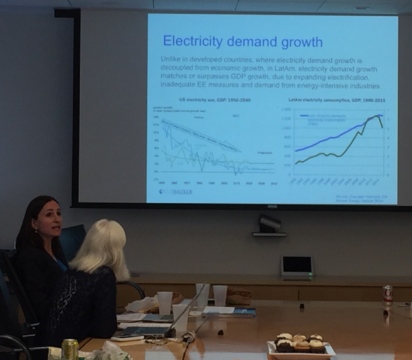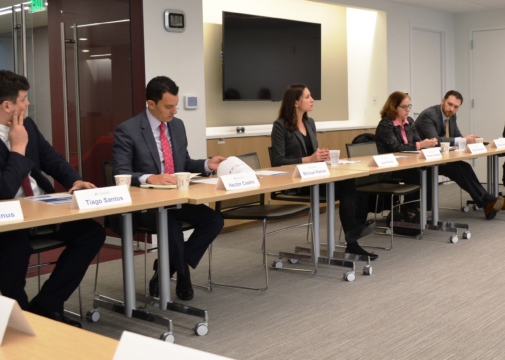Q: Arturo Valenzuela, the U.S. assistant secretary of state for the Western Hemisphere, announced in an email to his staff on May 5 that he is stepping down this summer to return to his academic position at Georgetown University. What have been Valenzuela's successes and shortcomings in the position? What does his departure-along with vacancies in the U.S. ambassador posts in Mexico, Ecuador, Venezuela and Bolivia-mean for the state of U.S. diplomacy in the region? What type of experience and qualities should his successor have?
A: Jeffrey Davidow, president of the Institute of the Americas and former assistant secretary of state for inter-American Affairs under President Bill Clinton: "Valenzuela's departure will create a gap in the State Department in that he takes with him an unparalleled network of Latin American contacts developed from his years of experience in government and academia. Indeed, his ability to reach out and make that quiet phone call to actors in the region who hold him in high regard to set a problem straight or to keep one from developing was one of his most valuable, if unheralded, contributions. His tenure has proven successful on several fronts: the Honduras mess was handled about as well as possible, new emphasis on energy and public security has been widely accepted and Plan Colombia and the Mérida Initiative have advanced. Finding a replacement will be tough. The position is a particularly difficult one in that so many of the issues that are most important, or at least salient, in the U.S.-Latin American relationship are overly politicized and outside the manipulation of the assistant secretary-think Cuba, immigration and trade agreements-which move, or don't-at a pace dictated by a larger domestic political game which has not much to do with the Department of State. There are several career people with extensive experience and operational skills. Nominating a noncareer person in Washington's poisonous political environment is likely to be a recipe for a long slog through the congressional swamp. The absence of ambassadors in key embassies is troubling. As a rule, the United States should have ambassadors in every-repeat, every-foreign capital. The leaders of some countries may not be the kind of people you would invite home for a barbecue, but diplomats get paid to deal with the world's moral flotsam and jetsam. We should stand ready to get ambassadors back into all posts, if and when, the level of petulance, pettiness, primitive anti-yankuismo and poverty of thought of the leaders of other governments allow for it. Not because we like them or even respect them, but because they are there and that's what we do."
A: Roger Noriega, managing director of Vision Americas LLC and former assistant secretary of state for Western Hemisphere Affairs under President George W. Bush: "I was pleased when President Obama named Arturo Valenzuela to that important post, and I said so publicly at the time. He is a thoughtful, respected regional specialist with significant government experience and longstanding relationships among leaders in the Americas. Unfortunately, his tenure began with the debacle in Honduras-where administration leaders (except for Secretary of State Clinton) defended Mel Zelaya's unconstitutional bid to hold on to power. A zig-zagging policy eventually offended a host of players across the board-Republicans in Congress, Brazil's powerful diplomacy and the irascible Chávista caucus. It is well known that Secretary Clinton soon had doubts about Arturo's instincts-particularly when he continued to advocate the re-election of José Miguel Insulza at the Organization of American States, even after Insulza had double-crossed Clinton on a number of issues. In addition, Arturo's heart did not seem to be in the bureaucratic mud-wrestling over policy. The National Security Council Senior Director Dan Restrepo-Valenzuela's junior in every respect, but a veteran of the Obama campaign-refused to establish a collegial relationship with his State Department colleague. As a result, any meaningful initiatives that Valenzuela had in mind failed to prosper. Instead, the Western Hemisphere team drifted from the Honduras episode to the virtual expulsion of two U.S. ambassadors (in Mexico and Ecuador) and the rejection of Larry Palmer for Venezuela. And State was a mere bystander as the Colombia and Panama free trade agreements were revived by congressional Republicans. In short, countries in the region have concluded that there is no downside in defying Washington and very little upside in being our friend. Arturo's successor will be playing catch up trying to reverse that trend as well as finally facing facts about Chávez's dangerous relations with Iran, narcotraffickers and terrorist groups."
A: Peter F. Romero, CEO of Experior Advisory and former assistant secretary of state for Western Hemisphere Affairs under President Bill Clinton: "The cover story is that the region has distanced itself from the United States. It has diversified its markets, enjoyed a boom in commodity prices and investment, and resolved its own regional disputes. But, isn't this what U.S. government policy has sought to achieve for the last 20 years-a more prosperous, self-confident Latin America? They have moved on, we have not. The U.S. government has not been marginalized, as much as we have marginalized ourselves. In the post-9/11 era we have fallen behind. Reference our inability to pass immigration reform, renew Andean trade preferences and agreements and end being the gun 'supermarket' for narcos. Worse still, we have been silent in the face of complicity by Venezuelan and Ecuadorean officials to subvert Colombia, allow criminal networks to flourish and suppress opposition voices. The next assistant secretary must convince the White House to move on the above agenda and to further advance the already unprecedented cooperation with Mexico. He or she must take our discreet working relationships out of the closet and forge a broad consensus around 'red lines' concerning corruption, organized crime, weapons proliferation, support to guerrillas and democratic practices. We should start with Canada, Mexico, Brazil, Chile and Colombia. Consensus means listening, but we must be unambiguous about our intention to act. To overcome our timidity and lethargy, the next assistant secretary must be both a visionary and activist. He or she should be persistent and persuasive, not into momentary problem-avoidance. The consensus must become the medium by which we converse. Internally, the assistant secretary must reassert the bureau's control over the policy and its execution. We should end 'pet' programs when our ambassadors are expelled or the United States becomes the whipping post. Some leaders must see that the United States does not need them more than they need us. This might be debatable with Afghanistan; it's not with Nicaragua, Bolivia, Ecuador and Venezuela."
A: Otto Reich, president of Otto Reich Associates LLC and former assistant secretary of state for Western Hemisphere Affairs under President George W. Bush: "Another assistant secretary for the Western Hemisphere departs prematurely. Why does this bureau suffer that fate so frequently? When I held that position, I learned that Western Hemisphere Affairs is considered by the department's Inspector General's Office as the most 'political' of all bureaus. Apparently because its area of responsibility is so close geographically to the United States, the assistant secretary receives the most scrutiny and pressure from the department's various domestic constituencies. My advice to the Obama administration as it chooses Valenzuela's successor is to recognize that the assistant secretary for this region must be a politician as much as a diplomat. To succeed, the assistant secretary should have prior relevant federal government, business and military experience, since those form important parts of the portfolio. This experience must be personal and real-world, not theoretical. The assistant secretary must be: a good administrator, to manage a bureau of 12,000 people and a budget in the billions of dollars; open to the advice of excellent foreign service professionals while being prepared to ignore the advice of the mediocre; a bit of a psychiatrist to effectively deal with some quirky (mildly put) government officials and heads of state in the region; know quite a lot about Latin America, but more about the United States. Also, the assistant secretary must resist the urge to travel constantly to the region. While occasional visits are essential, the job of making policy and ensuring its implementation is done in Washington, not in the capitals of the Americas. Most importantly, whoever is selected should actively support all U.S. friends, oppose all U.S. foes and ignore the neutrals. This administration has tended to confuse the three."






















